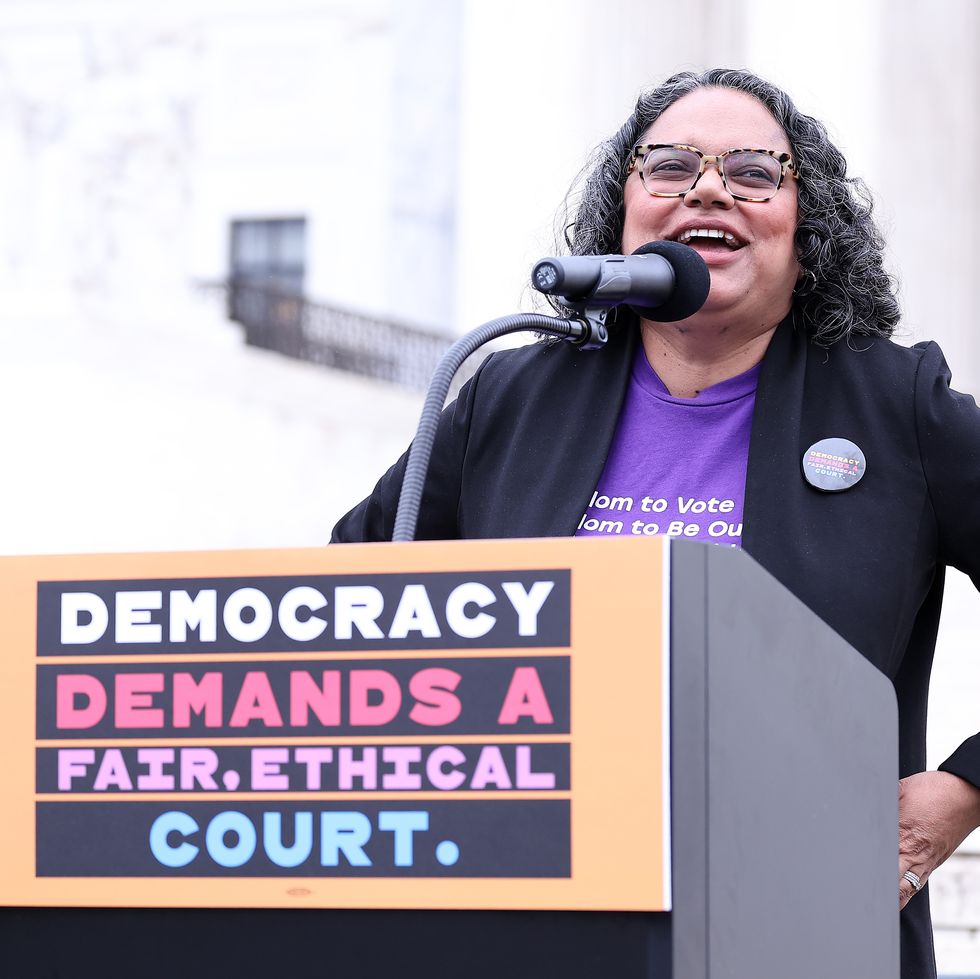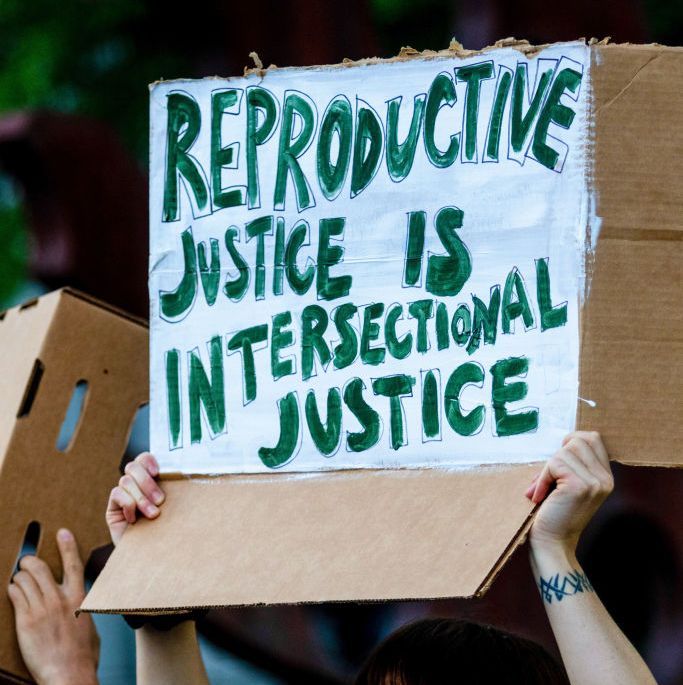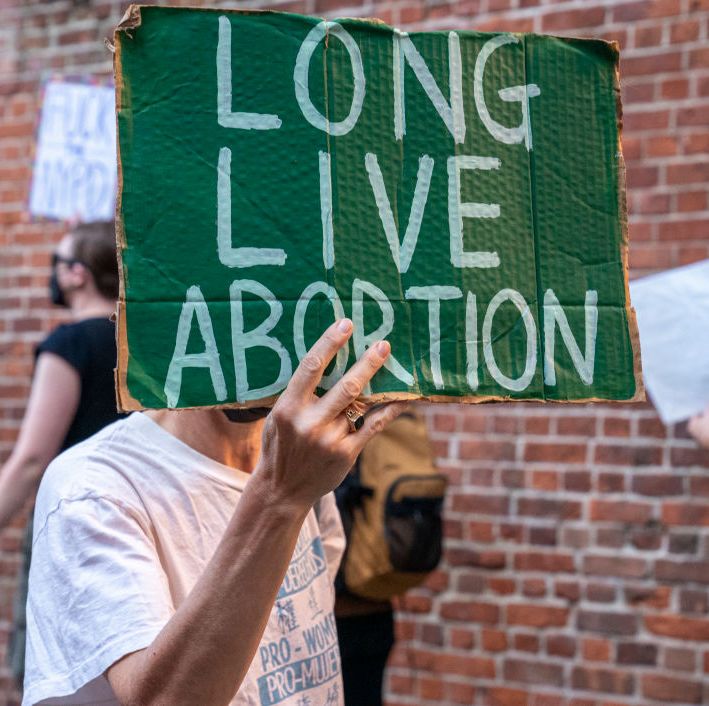Products You May Like
Over the last 54 years, NARAL Pro-Choice America has become one of the largest and most well-known abortion rights advocacy groups in the nation, a mouthful of an organization that fights for access to reproductive health care at the federal and state levels.
But as of Wednesday, NARAL has changed its name to Reproductive Freedom for All, a new moniker that the organization says represents their path forward in a post-Roe America. In the wake of the Supreme Court’s decision in Dobbs v. Jackson Women’s Health Organization, the case that overturned Roe, patients across the country have needed to travel further, spend more, and risk their health in order to receive abortion care; presently, 14 states ban nearly all abortions while two others, Georgia and South Carolina, ban nearly all abortions after six weeks of pregnancy. Reproductive Freedom for All is betting that their new name communicates what they intend to do about it—and resonates with constituents.
“Reproductive freedom, to us, encompasses that broader range of policy outcomes that are necessary for us to get to abortion access being legal and unfettered in this country,” Mini Timmaraju, president of Reproductive Freedom for All and the first woman of color to lead the group, told ELLE.com. Timmaraju says this includes repealing the Hyde Amendment, eliminating the filibuster, and focusing on issues like contraceptive access, maternal health outcomes, and paid family leave, as well as abortion access.
Below, Timmaraju shares how the organization decided on its new title, why it was essential to eliminate the phrase “pro-choice,” how the name is connected to their internal diversity and inclusion efforts, and why this doesn’t mean their leaving abortion behind.
NARAL Pro-Choice America is now officially Reproductive Freedom for All. Can you talk a bit about the impetus behind wanting to change the name?
We are trying to win over hearts and minds of the American people. As an organizer, if I’m knocking on a door and I’m like, “Hey, I’m with Reproductive Freedom for All,” I’m not spending five minutes explaining what we’re there to do. That’s really powerful and important.
We started testing “reproductive freedom” as the primary messaging framework and started adapting it back in 2018-19, and it was sort of out of sync with our [old] name. Also we’ve learned from our friends in the reproductive justice movement that “choice” isn’t accurate for the people most affected and impacted by abortion bans and restrictions. They don’t have a choice. So framing this as a choice vs. life issue is a failing binary. It doesn’t resonate with voters and isn’t true to our values. The name NARAL in its various iterations has served us incredibly well, has got us to four million members, has helped us secure major legislative victories, and we sunset it with the most respect and love and appreciation for what it’s done for us in the movement.
But now it’s time for something new. And quite frankly, if we don’t do things differently post-Dobbs, we’re making big mistakes. We’re committing malpractice. We have to rethink everything we’re doing to win.
How did you all land on the phrase “reproductive freedom”? What are you hoping it communicates?
My understanding—because I’ve only been here about two years, and I wasn’t here when we did the fundamental shift from “choice” to “reproductive freedom”—we were losing some significant battles in the messaging war. My predecessor, Ilyse Hogue, and our colleague Adrienne Kimmell decided to start really digging in on alternative messages and new ways to reach American voters on the issue of abortion. This is pre-Dobbs, but post-Trump. The freedom to decide if, when, and how to have a family was just so much more salient with folks who had not thought about the issue from that lens or that perspective.
Also, we learned from our colleagues who represent Black and brown women and communities in this country—the most marginalized folks, the most affected by these bans—that they never had a choice. Even though Roe was the law of the land, because of targeted restrictions against abortion providers, if there’s one clinic and it’s 100 miles away, there’s a 72-hour waiting period, and you have a mandatory ultrasound, did you really have a choice to have an abortion? It’s important for us to acknowledge, putting political effectiveness aside, that terminology wasn’t representative of the challenges our most affected communities face.
Now, what we’re trying to do in this next iteration is connect the messaging to our values and create a movement that is more inclusive. We have a majority white women membership. We can’t win political wars with only white women. White women will continue to be critical and important to us, but we need a broader coalition to win, and we need to center the folks most affected—they should be leading the fight, because they’re more impacted.
On that note, I wanted to ask about the “For All” in the name. In 2020, before you became president, there was reporting about diversity and inclusion issues at the organization. A former employee said it was “an open secret” that NARAL was “by and for cis white women.” How do you feel the new name illustrates the work you all are doing both behind the scenes and on the ground to make sure all folks are included in this fight?
I’m so glad you asked, and it’s such a big question. I am the first woman of color to run this organization, and I have an extensive professional background in DEI work, and I wouldn’t have come here if the board and my predecessor had not made significant investments and commitments in equity. They put out a road map to equity for the organization that’s guiding a lot of our policy work and our organizing work to this day.
I started my career at Planned Parenthood in Texas; I worked hand in glove with my colleagues from NARAL. And I thought it was really impressive that when those stories came out in 2020, instead of retreating or being defensive, they were like, we’re going to reckon with this, and we’re going to deal with it. I found out very quickly when I got here that they were really, really serious. They had allocated a significant amount of resources to build a DEI team, which we’re now calling Equity, Culture, and Talent.
We have a team digging into the culture of the organization, into board recruitment, leadership recruitment, really being aggressive and intentional about diversity efforts, but also working with all staff on culture and how do we show up differently, internally and externally.
And I want to be clear: We don’t wake up with the new brand and “For All” in our name, transformed. This is another step in our transformation. It’s an opportunity for us to announce our intents both to the world but also to our own staff and our own members. We need to live our values. So what does that look like? That means more investment in organizing and communities of color but not supplanting RJ [reproductive justice] groups that are already deeply invested. Partnering, working more smartly, endorsing more diverse candidates, investing resources in policy fights that affect the folks most affected by bans. Doing better work and smarter work with young people by launching digital organizing tools.
So we take this seriously. The “For All” is not an accident. When we did the research and the message testing, “For All” kept rising to the top, and we oversampled young people and people of color, and we saw how the “For All” was shifting perception when combined with reproductive freedom. And we knew it was a really elegant way for us to double down on our equity efforts. Just by virtue of me being person of color, things don’t magically change here, but these are the intentional steps we can take to challenge ourselves.
You also spoke about the strategy needing to shift post-Dobbs. How do you see the new name symbolizing that path forward?
It’s going to be so important that, in addition to fighting for our federal legal rights to abortion, re-establishing a federal right and these ballot initiatives in the states, that we also aggressively tackle the access piece, which starts with eliminating the Hyde Amendment [which prohibits federal funding for abortion]. We were already engaged in the fight to end Hyde, taking the lead of our colleagues in the RJ community, but we have to invest more resources in that fight. We know that just restoring federal and state-level rights won’t be enough.
We have to be more invested in bigger solutions. We have an opportunity with the American people right now where American public opinion is shifting so fast on abortion access, because real-life horror stories are coming out of these states with bans. We have an opportunity to educate and move the American people and move our elected officials further than we thought, even just a year ago. Our job is going to be to push as hard as we can. We’ve come really close to eliminating any anti-choice Democrats in Congress, but we haven’t finished the job. We are going to try to finish that job. We’re going to make it not okay to run as a Democrat if you’re not pro-abortion access and pro-reproductive freedom. We have this moment, and we have to grab it and push for as much as we can, not only because we have a moral obligation to do it, but because we have an opportunity.
You all have made it clear why you decided on “Reproductive Freedom,” but I did want to ask about the decision to not include the word “abortion” in the name.
That was a tough one. I don’t want anyone to think we are moving away from abortion. We know saying abortion is critical. You will see abortion all over our messaging, all over our website. The tip of the spear for reproductive freedom is abortion access, but there is a larger range of policy outcomes that we need to get to have true reproductive freedom. That includes the larger list of gender justice issues. It includes contraceptive access, it includes paid leave for all. It includes investments in maternal health outcomes. But we also contend it includes things like our democracy. and this goes back to the “For All.” We know that, because of the fundamental challenges and threats to our democracy, things like the filibuster, voting rights, and corruption on the Supreme Court and the federal courts, we cannot get to true reproductive freedom. We can’t get to abortion access, because we have not addressed this larger set of issues in this country. We have to have a multi-pronged approach.
Reproductive freedom, to us, encompasses that broader range of policy outcomes that are necessary for us to get to abortion access being legal and unfettered in this country. And when we say “For All,” I also credit the RJ community for raising the red flag for us that voting rights and the filibuster are critical to overcome. We only recently came around on the filibuster just a couple of years ago. The RJ groups are way ahead of us, leading the way. This is why we have to leverage the power of historically white women-led organizations that have the membership and the resources to be in these bigger fights and to be inclusive, because without fundamental change around these democratic institutions, the rest of the things we care about just will not happen. That’s why the choice to say “reproductive freedom.” It’s a broader range of issues, but it’s not in any way, shape, or form hiding from abortion.
This interview has been edited and condensed for clarity.
Madison is a senior writer/editor at ELLE.com, covering news, politics, and culture. When she’s not on the internet, you can most likely find her taking a nap or eating banana bread.



